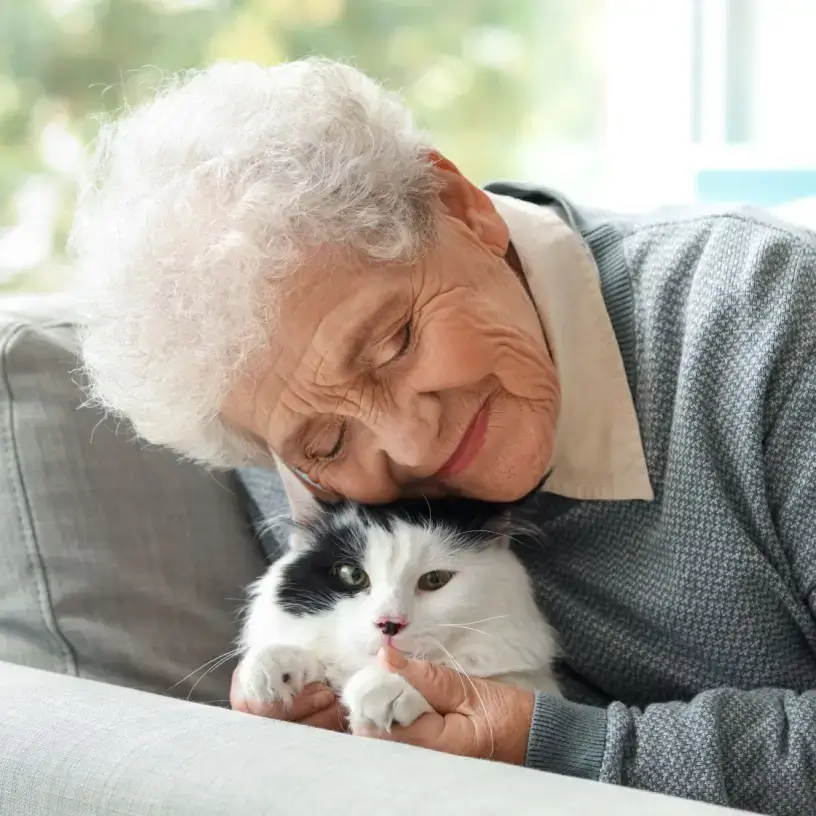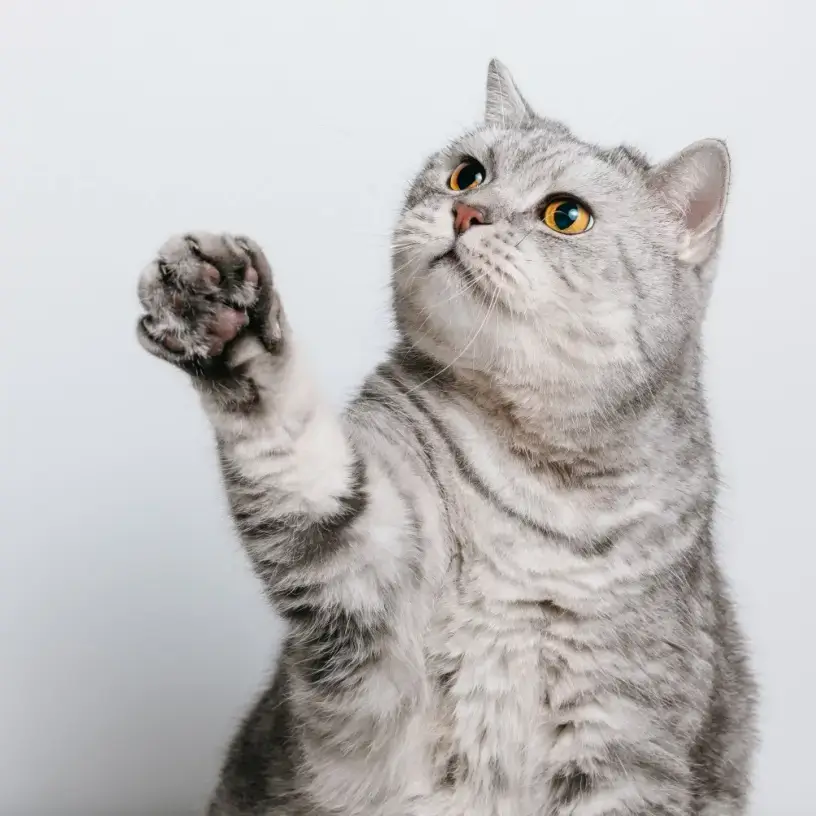Home / Compare Pet Insurance / How much does a cat cost…

Key takeaways
- The upfront cost of owning a cat in Australia can be expensive as it includes purchasing or adopting the cat, vaccinations, microchipping, de-sexing, council registration and other initial care costs. Many are one-off fees but can add up quickly in the first year.
- Cat owners spend an average of $1,715 per year on their pets. The largest expenses include cat food, vet visits, and healthcare products. Pet insurance, while optional, may help cover some of these costs.
- There are several ways you can lower the cost of cat ownership without compromising on your pet’s needs and health. These include adopting a cat from a shelter, performing DIY grooming, buying food and litter in bulk, and comparing pet insurance plans for the best coverage and rates.
How much does a cat cost in Australia?
According to the latest report by Animal Medicines Australia, the average price to buy a cat is $804.1 This cost can vary depending on the breed and age of the cat, as well as whether you buy your feline from a breeder or adopt it from a rescue shelter. A mixed-breed cat generally will cost less than a purebred or designer cat like a Ragdoll or British Shorthair, and the cost of a cat adopted from a rescue shelter is usually lower than buying from a breeder.
Other than the initial cost of purchasing a cat, there is also the financial commitment to raise and provide for it, such as feeding it and vet fees.
How much does a kitten cost in their first year?
A kitten could cost you between $3,000 and $6,000 in their first year, according to the Australian Government’s MoneySmart website.2 Pet ownership is generally more expensive in the first year due to prescribed costs like microchipping, initial vaccinations, de-sexing, council registration fees and adoption fees (if applicable). Pet owners with new cats also tend to spend money on pet products like food bowls, litter boxes and scratching posts.
The cost of owning a cat over time
Cat owners spend an average of $1,715 on their feline each year, including all costs associated with keeping them fed and well.1 According to Animal Medicines Australia, this is what households are spending annually (which may include multiple cats per household), sorted by category.
| Item(s) | Average cost(s) |
|---|---|
| Cat food | $1,595 |
| Vet visits/services (including vaccination costs) | $388 |
| Healthcare products | $280 |
| Accessories and other cat products | $181 |
| Pet insurance | $94 |
| Grooming services | $70 |
| Minding/boarding fees | $53 |
| Training classes/behaviour therapy | $22 |
| Transport costs | $16 |
| Alternative healthcare treatments | $7 |
1Animal Medicines Australia: Pets in Australia: A national survey of pets and people.
Remember, these are cost estimates and may change over time. They’ll also depend on your pet’s health status and needs, indoor/outdoor preference, expected lifespan (13-17 years) and budget.
Learn more about the cost of owning a cat
Microchipping my cat
In Australia, microchipping your cat is compulsory in every state except the Northern Territory, where it’s only required in Darwin.5 It’s important to microchip your moggie to help identify your beloved pet if it goes missing.
The average cost of microchipping for cats is around $60, according to the RSPCA.4 Your pet insurance policy may contribute to the cost of this once-only payment if you have the routine care option added.
Registering my cat
Cats older than six months typically need to be registered with your local council. However, rules and requirements vary between urban and rural areas because indoor cats can become a problem for protected wildlife and endemic species.
For example, council registration in NSW can cost about $23-$201 (de-sexed or not de-sexed).4 Each council has its own rules about how and when to register your cat; contact them directly for the latest advice on pet registration.
Annual vaccinations, worming and flea checks
Annual cat vaccinations and vet check-ups can cost around $90, according to the RSPCA.1 Meanwhile, flea and worming treatments can set you back about $100 annually. Most vets recommend yearly check-ups to ensure your furry friend is up to date with their vaccines, worming treatments and flea checks. On the flip side, adopted pets may have their first round of vaccines included with their adoption fee.
Some pet insurance policies may cover some of these preventative costs if you have a routine care add-on. This type of cover may also help pay for general health checks, worming, teeth cleaning and more, so check with your insurer what you’re covered for.
De-sexing my cat
According to the RSPCA, de-sexing a cat (male or female) can cost roughly $115- $300.4 Neutering/spaying a female cat is typically more expensive than de-sexing a male cat because the procedure is more complex.
One of the perks of adopting or rescuing a cat is that they’re typically already de-sexed by the shelter, and this cost is usually included when you adopt your pet.
Pet insurance
 The cost of pet insurance for a cat may vary depending on your cat’s age and health status, your policy (i.e. level of cover) and your insurer; the good news is that cat breeds don’t significantly impact the annual cost of pet insurance. Finding your cat injured or sick is distressing enough without worrying about how you’ll afford the vet bills, which can be expensive.
The cost of pet insurance for a cat may vary depending on your cat’s age and health status, your policy (i.e. level of cover) and your insurer; the good news is that cat breeds don’t significantly impact the annual cost of pet insurance. Finding your cat injured or sick is distressing enough without worrying about how you’ll afford the vet bills, which can be expensive.
Pet insurance can help cover a portion of your veterinary care costs – depending on the type of pet insurance you choose – as well as a variety of other vet treatments and pet-related expenses.
Our pet insurance comparison service compares a range of pet insurance policies online all at once. Within minutes, you can get an insurance quote for your cat and see what features are on offer from different brands.
Pet insurance policies vary depending on the insurance company, so always read the Product Disclosure Statement (PDS) and Target Market Determination (TMD) to know exactly what you are and aren’t covered for, and whether the product is suitable for you.
Ongoing and optional costs
Cat food and litter may set you back upwards of $1,000 each year. This will typically make up most of your ongoing costs, so that’s where savings opportunities lie. You may opt for dry cat food as it’s cheaper than canned food and buy kitty litter in bulk.
Alternatively, cat carriers, toys, loungers and cat beds are optional costs. You will find cats sleeping anywhere cosy, like on your bed or a towel (or sometimes in weird places!) and playing with anything that moves or rolls, so expensive toys are often unnecessary or may even go to waste.
How can I reduce the cost of owning a cat?
Remember that all these costs mentioned are averages and estimates, so your expenditure could be different. However, here are some ways you can keep costs down:
- Adopt your cat: Adopting or rescuing your new cat from a shelter may be cheaper than buying it from a shop or a breeder. You’ll also be giving it a much needed, loving home.
- DIY grooming: Cats are already self-cleaning, and you can save a little more cash by grooming them yourself (although you’ll need to get the wallet out for the brushes and clippers).
- Insure your pet early: Get pet insurance early in your cat’s life before they develop any health problems since most insurers consider health issues as pre-existing conditions that’ll cost you extra to cover (or be excluded from coverage entirely). It’s also best to compare your options to find the best quote you can.
- Reduce ongoing costs: Buy pet food in bulk, and shop around for pet products like water bowls and litter trays. You should also consider alternatives like string and cardboard boxes instead of toys to keep your feline entertained on a budget. Get creative!
Meet our pet insurance expert, Adrian Taylor
As a General Insurance expert with over 13 years’ experience in financial services, Adrian Taylor knows that dogs and cats get themselves into all sorts of mischief. One part of Adrian’s work is to help empower consumers to understand how pet insurance can help save them from exorbitant vet bills when their pet gets injured or falls ill.
Want to know more about pet insurance?
1Animal Medicines Australia – ‘Pets in Australia: A national survey of pets and people.’ Accessed November 2024.
2Australian government Moneysmart – ‘Getting a pet – How much it costs to own a dog or cat.’ Accessed November 2024.
3RSPCA NSW – ‘Learn about the responsibilities of being a pet owner.’ Accessed November 2024.
4RSPCA NSW – ‘Costs.’ Accessed November 2024.
5RSPCA Knowledge Base – ‘is microchipping mandatory for cats and dogs?’ Accessed November 2024.



